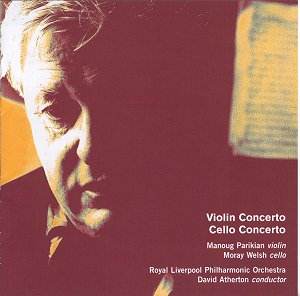NMC have enlisted Colin Matthews to provide a
foreword introducing this new Ancora series. As he rightly
remarks, a new piece of music often receives its first performance
(provided it was commissioned), may get a second one and then
just disappears. Recordings may follow the first performance but
they too may disappear from the catalogue. This may happen for
many different reasons, but often because the recording company
gets into difficulties of some sort. This is the case with many
fine recordings originally released by Unicorn and Collins Classics.
Thus Ancora aims at restoring this material on a more permanent
basis. The prospect is encouraging since further re-issues includes
a good number of pieces by Birtwistle, Casken, Goehr, Holloway,
Knussen and many others. Originally these were released many years
ago either by Unicorn or Collins. Not only will there be reissues
of now inaccessible material. NMC also plan so far feasible to
add some hitherto unrecorded work.
One of first releases in this hopefully continuing
series brings back two major works by Hugh Wood recorded in 1978
during the LP era and briefly available in CD format, if my memory
serves me well.
Though he may regarded primarily as a composer
of chamber music and of song cycles, which actually make the bulk
of his present output, Wood nevertheless contributed substantially
to the symphonic repertoire. I say ‘symphonic’ intentionally because
his Cello Concerto Op.12 and his Violin Concerto
Op.17 as well as his early Scenes from Comus Op.6
(NMC D 070 reviewed some time last year) are overtly symphonic
in scope, and extensively and imaginatively develop some limited
basic material in a completely symphonic process, never really
absent from the proceedings, though often intricately varied.
(To a certain extent, though, his Piano Concerto Op.31
– once available on Collins 20072 [single] – is somewhat more
extrovert and, on the whole, more accessible, though Wood is never
one to write down to his audience. Hopefully, this will also be
re-issued soon.) The symphonic nature of the Cello Concerto
Op.12 is clearly emphasised by its single-movement structure
unfolding as a massive, tightly argued arch-form (the composer
describes it as a large-scale sonata movement) building to some
impressive climaxes, though opening in the lowest register of
the cello and quietly dying away at the end.
Though in three movements roughly one the now
fairly traditional slow-fast-slow pattern, the Violin Concerto
Op.17 is also a predominantly symphonic structure (in
fact the Scherzo follows attaca on the first movement).
The first movement may be considered as a sonata exposition opening
and ending quietly, again with some powerful climaxes in between.
The Scherzo-with-trio also starts quietly, as if slowly emerging
from the tranquil ending of the preceding movement. The third
movement ("primarily a simple recapitulation of the first")
opens with a long cadenza, out of which the orchestra quietly
re-enters. The music progressively reaches the high Bs with which
the concerto began, and this might have been the logical conclusion
of the work which nevertheless ends "with a touch of flamboyance".
Though the solo parts are quite demanding and
taxing, both concertos are first and foremost powerfully expressive,
lyrical utterances; for, as I remarked in an earlier review of
Wood’s music, he is a born lyricist. His music, no matter how
structurally complex it may be, always communicates in convincing
terms, which is its most endearing quality.
Moray Welsh and Manoug Parikian, for whom the
Violin Concerto was written, are wonderful musicians who deliver
committed readings of these beautiful scores that should be heard
more often and that will now hopefully remain in the catalogue
for many long years. Hugh Wood’s music is simply too good and
too honest to be forgotten.
Hubert Culot
